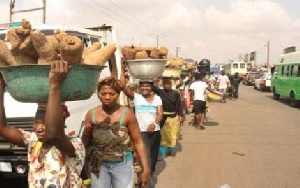The of Ministry of Gender, Children and Social Protection is collaborating with the Royal Netherlands for a six-million dollar project to reduce early marriage in Ghana.
Early marriage has been identified as one of the factors that cause girls to migrate from the northern sector of the country to the south and engage in head portage, locally referred to as the kayayei phenomenon.
Mrs Dela Sowah, Deputy Minister for the sector ministry, who announced the measure on the floor of Parliament, said the “kayayei” phenomenon had, over time, become a developmental issue and the Government was committed to implementing a long lasting solution.
She was answering a question that stood in the name of Ms Elizabeth Agyeman, Member of Parliament (MP) for Akrofuom, who sought to know what measures the Ministry was putting in place to solve the problems of the numerous kayayei in the markets and streets of Ghana.
According to the Deputy Minister, the actual number of kayayei in Ghana was not known since no national survey had been conducted.
However, the closest was a registration exercise conducted in Makola, Kokomba and Agbogbloshie markets in 2007 which captured 2,432; between the ages of six and 36 years.
Ms Sowah, who is also MP for Kpando, said a nationwide data collection exercise, with a technical team already in operation, was being planned to enable the collection of accurate data on kayayei for the Government to take informed decisions and enhance monitoring and evaluation.
Citing economic, harmful traditional practices and ethnic conflicts as some reasons for the girls migration to the south, Mrs Sowah said the girls mostly had no formal education, and one of the reasons they gave was to secure funds for the upkeep of their younger siblings back home.
The Deputy Minister cited extreme poverty in areas where the girls migrated from as one of the reasons for their movement, and said it was part of Government policy to reduce poverty, and extremely poor and vulnerable families through the Livelihood Empowerment against Poverty Programme (LEAP)
“As a condition to benefit from LEAP, families are to enroll and keep their children in school,” she said, and that the ministry had prioritised and a targeted to expand the LEAP to 15,000 beneficiary households with vulnerabilities from communities where the girls were migrating from.
Meanwhile, the House has dissociated itself from comments attributed to Nelson Abudu Baani, MP for Daboya/Makarigu, who was reported to have suggested hanging or stoning to death as the best punishment for women who engage in adulterous acts.
The members stated that the MP made suggestion in a media interview rather in a contribution a debate on the bill on last Friday.
The House noted that the MP’s contribution on the Interstate Succession Law was un-parliamentary, and had apologised for those comments when his attention was drawn to it.
Regional News of Wednesday, 19 November 2014
Source: GNA

















